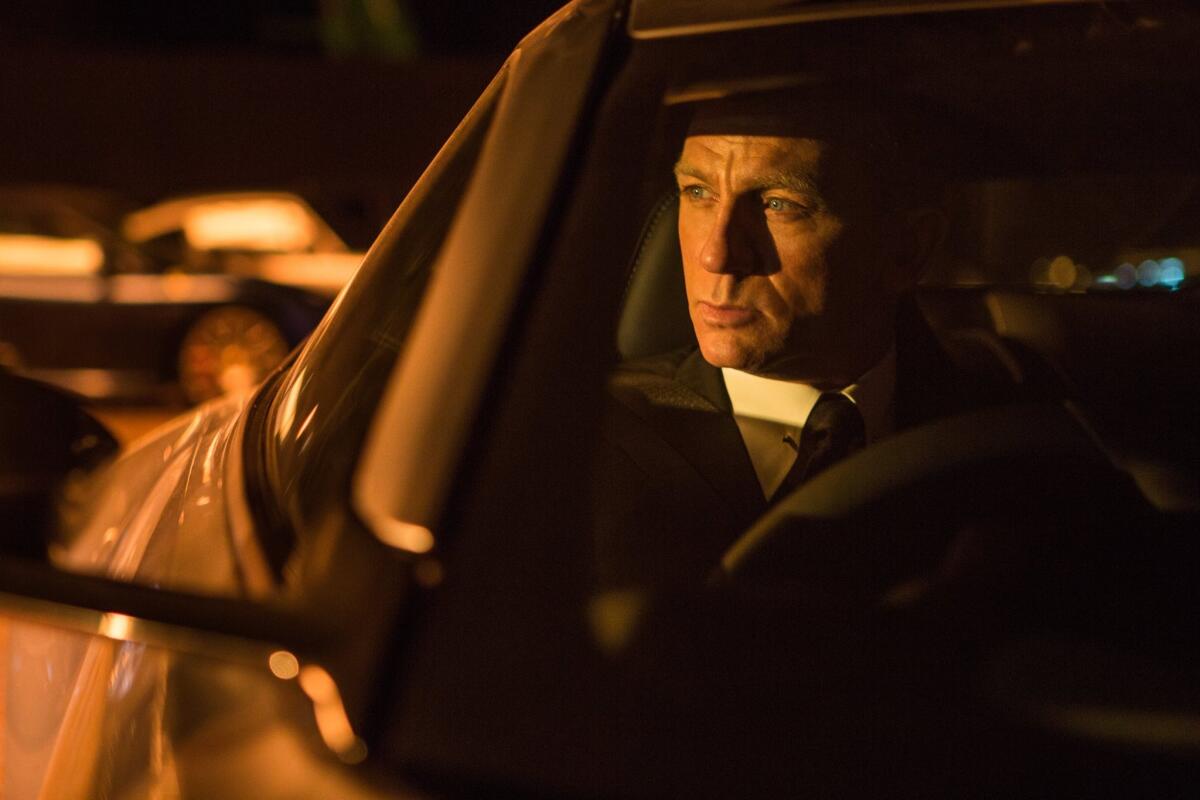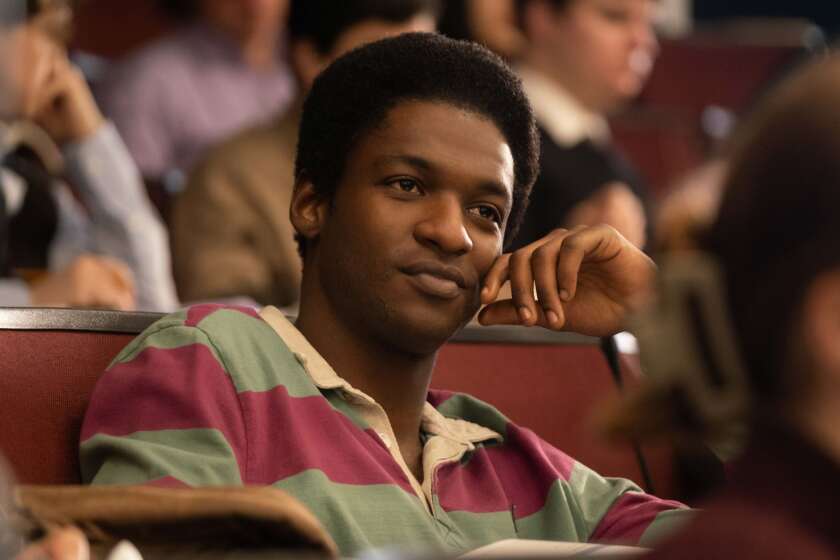‘Spectre’ box office: Where does this leave the Daniel Craig James Bond era?

Daniel Craig as James Bond in “Spectre.”
It’s almost hard to fathom how long James Bond has been around. The franchise has been through 24 films with main proprietor Eon Productions, and a 25th outside it, emerging in a postwar boom, continuing through the darkest days of the Cold War, moving into the end-of-history days of the 1990s and rising again after the Sept 11 attacks. Ten presidents have come and gone, with an 11th on the way, in the time that Bond has been on screen.
Since the debut of the film series with “Dr. No” in 1963, the world has gone longer than four years without a Bond movie only once. There are few things, culturally speaking, that have endured in the same way.
“When you say 52 years, consider what that means from a historical point of view. That’s half of film history,” said Christoph Waltz, the “Spectre” star and Bond villain of the moment, when I asked him how he looks back at the period.
Any series that’s been kicking around that long is bound to see some fluctuations in its popularity. Some movies land, and some — because of the ill-advised choices of those making them, because of an audience’s receptivity to a movie at a given time, or simply because of the filmmaker equivalent of a bad day — miss the mark.
That’s certainly true of Bond, which over its run has had a lot of hits, a select few very big hits, some mixed affairs and a few dogs. What’s interesting, though, is that the results actually haven’t swung much from film to film. You’d expect 25 movies to turn in numbers all over the map. But Bond results tend to stay consistent, with just a handful of exceptions, from one film to the next; it’s only when you start jumping across decades that some variability really kicks in. If you were graphing the numbers over time, it would look more like a normal EKG, with a few dips and jumps but a generally appearance of stability.
For example: Three of the four highest-grossing Bond movies came out in the 1960s, within just a three-year span: “Thunderball,” “Dr. No” and “You Only Live Twice,” which each averaged nearly half a billion in today’s dollars. (For all the comparisons, I’m adjusting for inflation, and I’m using domestic receipts; the global box office as we know it is a modern phenomenon.)
In contrast, three of the four lowest-grossing Bond movies in history came out in an equally compact period of time, over just four years in the 1980’s — “The Living Daylights, “License to Kill” and “A View to a Kill,” which averaged just about $100 million per movie. From a popularity standpoint, those movies were a world away from the trio of 1960s super-hits. And they all pretty much stayed close to one another, none vastly exceeding nor coming in below the other.
Bond is partly defined by its stars, so this clumping makes sense — a lot more people wanted to see Sean Connery than they did Timothy Dalton or late-era Roger Moore. But the results are also a function of the era — how well producers were able to align a malleable superspy with the zeitgeist of a given period. (Maybe, in the case of the top and bottom of the chart, the Cold War anxieties of the 1960s spelled a perfect moment for stories about Western intelligence agencies facing shadowy threats, much better than the latter part of the 1980s, when people were tired of the Cold War or beginning to sense its unraveling. It’s one theory, anyway.)
This notion of a series whose films perform in clusters — and, just as important, in concert with the times — came to mind this weekend with the opening of “Spectre.” The immediate comparison many box office pundits drew for the opening of $70 million was to “Skyfall” (the number fell short) and to “Quantum of Solace” and “Casino Royale” (it fell just short of the former and exceeded the latter). Yet the more telling analysis might involve not a look at the “Spectre” swing relative to other recent Craig movies but the Craig movies compared to other eras as a whole.
So how has the crop of post-Sept. 11 films stacked up to those from other periods? Let’s assume, semi-generously, that “Spectre” is able to sustain some momentum and get to $200 million, or even a couple million over. That would put the movie in 13th place among the 25 all-time Bond films. You can’t get more middle of the pack than that.
It would also put “Spectre” within 10 million of “Casino Royale” above it and “Quantum” below it, so the clumping theme continues. None of these movies will be higher than No. 10, but none below No. 14. Three of the four Craig movies (“Skyfall” of course is the exception, with $316 million and a third-place spot on the all-time chart) performed strikingly similarly, ahead of those from more disappointing eras but behind the more successful ones.
Incidentally, the Craig movies as a rule come in behind the Pierce Brosnan end-of-history Bonds — all four of which are in the top half of the rankings and will all top “Spectre” on the movie’s current trajectory. (One of the four Brosnan movies, “Die Another Day,” came out after 9/11 but was still very much a part of the world before it.)
It can sound a little strange to evaluate the Bond movies on the basis of attendance alone. After all, if you stopped a random group of people on the street, many of them would certainly say they prefer the Craig pics to the Brosnan ones. But Bond has always been about popularity, how it hits a kind of cultural solar plexus at the time that it strikes such a blow. And whether it’s the exultant fantasy of the Brosnan era, the more dour fears of the Craig era, or another factor, the majority of the Brosnan movies caught on in a bigger way, at least in theaters.
This all seems worth remembering, particularly at the moment. There’s a lot of hand-wringing among Bond fans about whether Craig will leave the series — my gut tells me yes, and I’m hardly alone in Hollywood — even if producers are keeping hope alive. It would certainly be a loss to those who’ve liked what he’s done with the role and what filmmakers have done with him in it. Craig has been the right man for the 21st century job, his tortured soul suggesting our collective jitters, his implacable bearing fulfilling our need to do something about them.
But further fears about what’s at stake in a Craig departure seem less productive. James Bond movies have been coming for a long time, and they’ll keep coming. Movies in the Craig era were popular. But other periods have exceeded it in popularity, and a new era could well come along to do so once more.
MORE:
Review: The ‘Spectre’ of burnout hovers over latest Bond film
Sam Smith on ‘Spectre’ theme: ‘I wanted to make it James Bond’s diary entry’
After all the kissing and killing, is James Bond about to call it a day following ‘Spectre’?
More to Read
Only good movies
Get the Indie Focus newsletter, Mark Olsen's weekly guide to the world of cinema.
You may occasionally receive promotional content from the Los Angeles Times.











